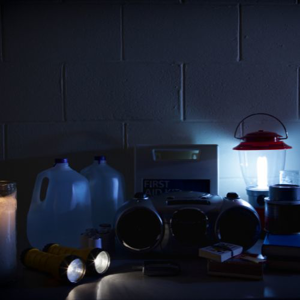
There are some general steps to start with for any power outage throughout the year. First, check to see if it’s just you. Is your house the only one affected? Or does the power outage affect the whole neighborhood? Check your breaker box or fuses and look at the power lines running to your home. If you see damaged or downed power lines, don’t approach them. Just call the electric company If the problem is just your breakers, you may be able to reset them, or call an electrician to help.
If a power outage occurs in your neighborhood, will you know what to do? Sometimes, people can be knocked off the power grid for days at a time, making it important that you know how to act to stay safe during an outage.
Preparing for a Power Outage
1. Make An Emergency Kit. An emergency kit should be stocked with basic supplies that you may need in case you're stuck inside or have to evacuate the home quickly. Include essential items like flashlights, batteries, food, and water.
2. Prepare Your Tech. During a power outage, having the ability to communicate and stay informed can make all the difference. Sign up for notifications from your power company and emergency services to get up-to-date reports as circumstances change. Stock up on alternate charging methods for your phone and any other devices that require power to continue receiving updates.
3. Learn About Your Community. Find out if your area has established emergency plans or designated safe areas for the community.
4. Plan Ahead. If you know a major storm is approaching, plan ahead. Fill plastic containers with water and place them in your refrigerator/freezer. This can help keep your food cold during a short power outage. Keep your phones charged as much as possible.
5. Create A Back-Up Plan. If you rely on battery-operated or power-dependent equipment, including medical devices, prepare a back-up plan.
6. Prepare Your Car. Gas stations rely on electricity to power their pumps. To avoid getting stuck when a power outage strikes, keep your car's gas tank full. In the event that you're without power for long periods of time, you can use your car to charge your phones and continue receiving important updates.
7. SPREAD THE WORD. Start a conversation with your friends and family to ensure everyone is aware of what to do and how to stay in touch during a power outage.
During a power outage, staying safe is the most important thing. In the winter months, this includes knowing how to stay warm. Be careful when using alternative heating and cooking methods and save your plumbing and electrical systems from further damage by taking steps to protect them from the cold too. Tips On Staying Warm During A Power Outage:
- Stay inside - there are few instances that may require you to make sure that everything is safe outdoors. But for the most part, stay indoors where it’s warm.
- Bundle up with blankets and keep on warm clothing.
- Move around enough to stay warm, but not enough to sweat.
- You can also hang dark blankets on your windows to increase insulation.
- Use towels to block gaps in your doors or windows to keep drafts from getting in.
- Close the dampers on any fireplaces you aren’t using to keep out cold air and drafts.
- Interior rooms like a basement, or any other room with no outside walls, may be better insulated from the cold.
- Take special note to care for infants, children, and seniors, who are all more susceptible to the cold.
- Use your hot water sparingly. Most hot water tanks can retain heat for up to 24-72 hours.
When the Power Comes Back On
Once the power outage is over, you should carefully assess the damage to your home and see what repair work, if any, needs to be done. You can also start slowly restoring your home back to normal by completing the following:
- If your main power switch is off, double-check that all of your appliances and electronics are unplugged before you turn it back on, to protect yourself from a power surge and the damage that comes with it.
- If your main water supply was off, turn it back on.
- Fill your hot water heater with water before you turn it back on.
- Replace anything that you used from your emergency kit such as batteries, medical supplies, and non-perishable food.
- Check the food in your refrigerator and freezer for spoilage and throw out anything that isn’t safe to eat.
- Check to confirm that you don’t have any frozen or burst pipes.
Knowing how to prepare for a power outage can make an enormous difference, especially when winter weather turns harsh. Nobody wants to deal with losing power. When you make it out of a life-threatening situation like a winter power outage, the last thing you need is more stress trying to repair the winter weather damage to your home. Your local restoration experts at ServiceMaster Restore can help you determine how bad the damage is, what can be saved, and what needs to be repaired or replaced. They can help you get back on the path to recovery and make your house a home again.
